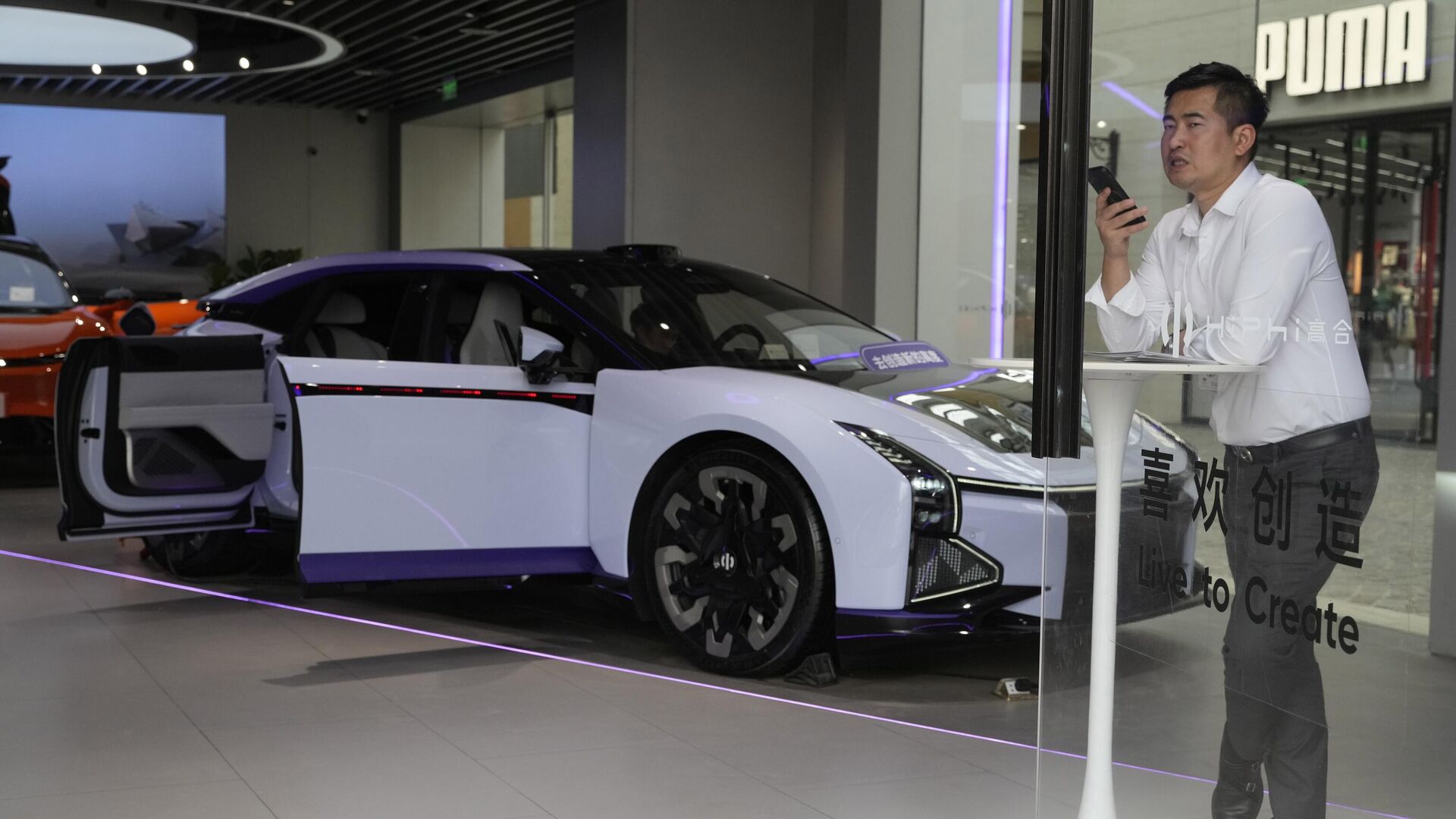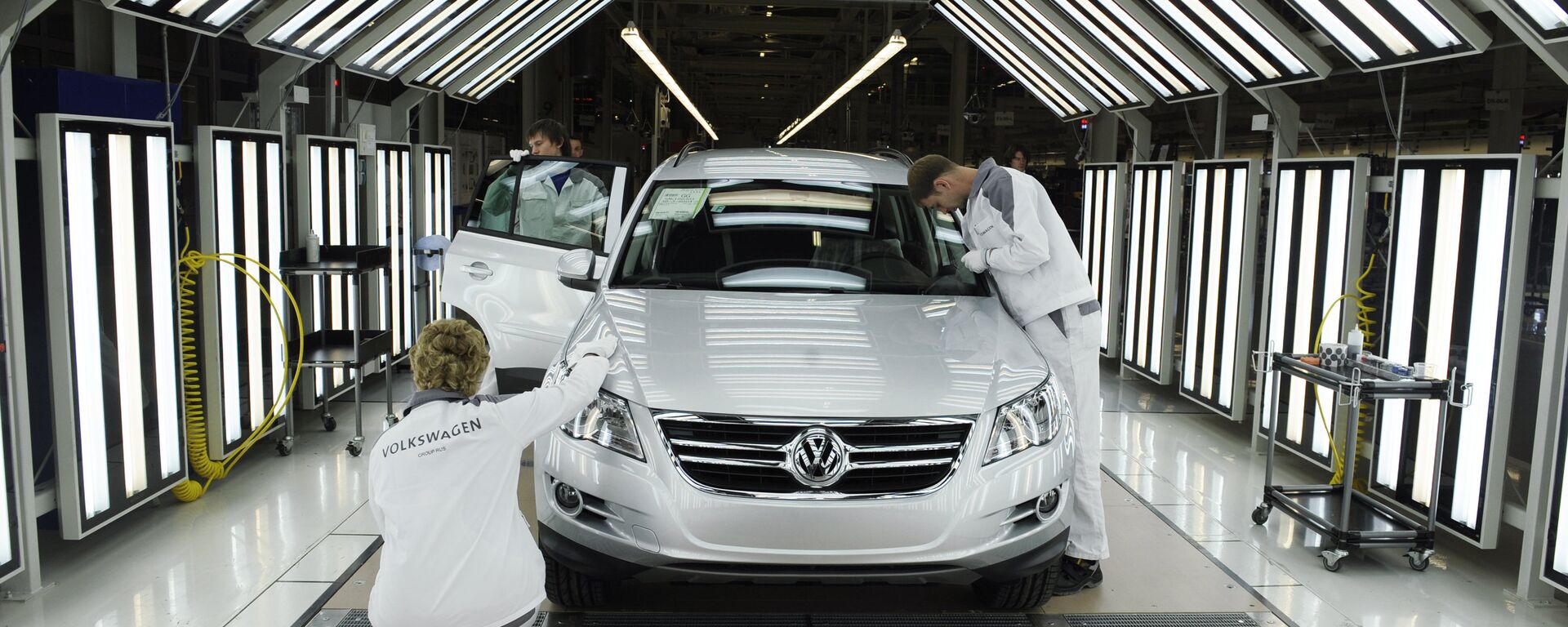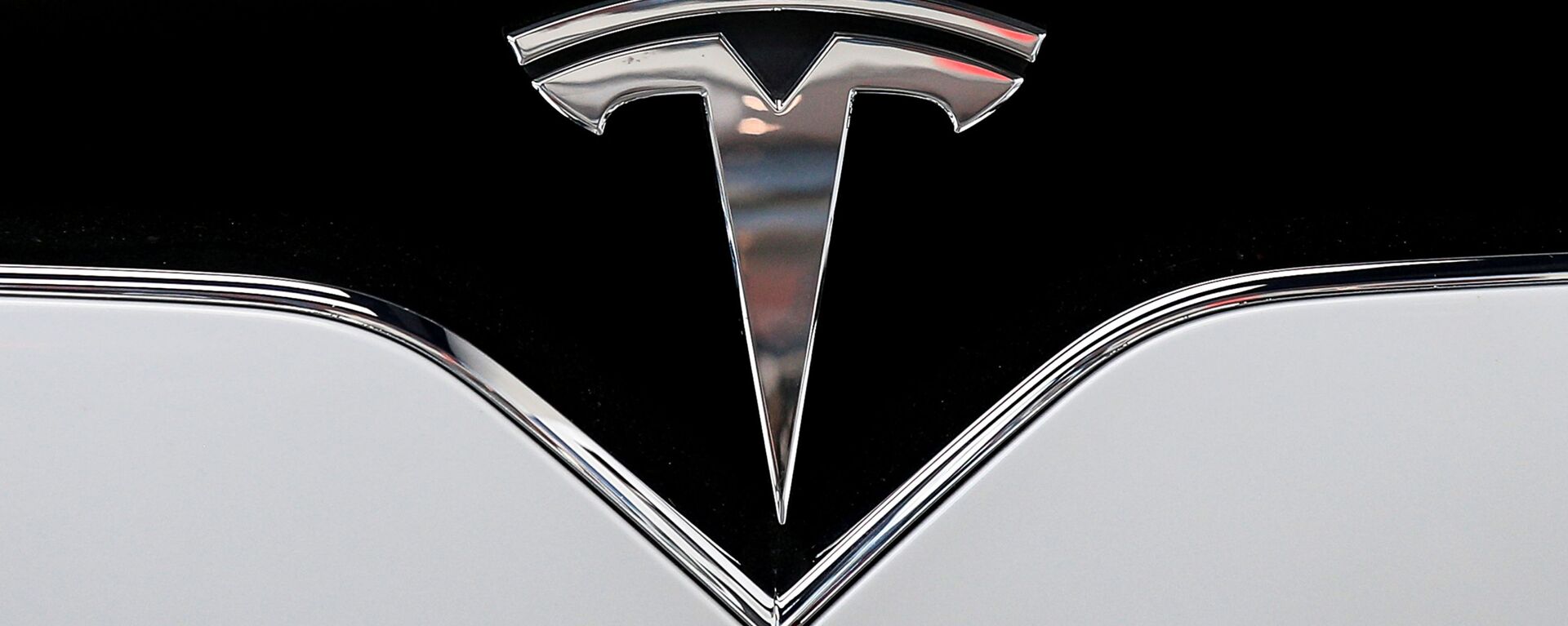https://sputnikglobe.com/20230910/why-chinese-cars-steal-the-show-at-munich-auto-expo--1113236755.html
Why Chinese Cars Steal the Show at Munich Auto Expo
Why Chinese Cars Steal the Show at Munich Auto Expo
Sputnik International
Germany faces economic challenges, particularly in energy costs, as it seeks to revive its auto industry. This demands adaptable strategies and a readiness for innovation. The focus on Chinese automakers at the show underscores the increasing competition in the global electric vehicle market.
2023-09-10T08:18+0000
2023-09-10T08:18+0000
2023-09-10T08:18+0000
world
newsfeed
olaf scholz
china
germany
munich
volkswagen
saic
chinese ministry of public security
audi
https://cdn1.img.sputnikglobe.com/img/07e7/06/0c/1111090706_0:49:3072:1777_1920x0_80_0_0_026ef758c988834f0a1db8e5a8c5b28e.jpg
This year's biennial Munich Auto Show (IAA Mobility) has showcased elegant electric vehicles (EVs), marking a notable transition in the international automotive sphere. Chinese automakers have taken center stage, striking a huge impression with their technological sophistication and lower costs. As a result, they have demonstrated a significant shift in the industry's landscape, highlighting their prowess in the EV market and challenging the positions of German and European electric car manufacturers.The Rise of the Chinese Car IndustryAccording to an International Trade Administration (ITA) report earlier this year, China remains at the forefront of the global automobile market, in pole position in yearly sales and production. In 2021, sales surpassed 26 million vehicles, with 21.48 million being passenger automobiles, showing a 7.1 percent increase from 2020. By 2025, the country is projected to manufacture 35 million vehicles. China dominates the global new energy vehicle market (NEVs). As per the Chinese Ministry of Public Security data, by the end of 2022, China boasted an impressive 13.1 million NEVs. This represents a substantial surge of 5.26 million vehicles, marking a striking annual upturn of 67.13 percent against 2021. The ministry added that by 2022, there will be 417 million vehicles in the country. Of these, 319 million will be cars, comprising 76.59 percent of the total vehicles, marking a rise of 17.52 million or 5.81 percent from the previous year.According to Chinese enterprise search figures, the country is home to over 600,000 companies involved in manufacturing NEVs and ancillary services. In 2022, there were 239,400 new enterprises added, showing a 40.34 percent increase compared to 2021.In 2022, the Passenger Car Association reported that BYD, SAIC-GM-Wuling, Tesla China, Aion, and Changan Automobile took the top five spots for new energy vehicle sales in China. They sold 1.79 million, 442,100, 439,800, 304,911, and 273,757 vehicles respectively.Effects of Germany's Economic Woes on its Automotive IndustryThe international auto show reflects the difficulties the German economy is up against.In June, Europe’s economic powerhouse saw a 1.5 percent descent in its industrial output compared to May. This decline was mainly prompted by a 3.5 percent drop in Germany's automotive industry. The slump reflects Germany's broader economic stagnation.The plunge in German industrial output is well beyond what economists predicted and increases the likelihood of the manufacturing giant experiencing another downturn later this year, which could push it back into recession, media sources say.The German Association of the Automotive Industry noted that roughly 2.2 million cars were produced in the first half of the year. While this is a substantial increase from the same period in 2022, production remains 10 percent lower than the first half of 2019. It may still take some time to return to pre-COVID-19 manufacturing output levels.“German industry remains in rough waters,” Salomon Fiedler, an economist at Berenberg, noted last Monday. In addition, he pointed out that last year's abrupt spike in energy prices and a dip in demand from the US and China were among the contributing factors. For example, Volkswagen said that its deliveries in China dropped by 14.5 percent in the first quarter. Although there was a recovery in April and May, general deliveries for the year's first half were still 1.2 percent lower than in 2022.However, many factors contribute to the woes plaguing Germany’s automotive industry.Problems Confronting Germany's Auto IndustryThe seemingly never-ending high energy costs are a big problem for German companies, especially those using lots of energy, like heavy industries. Energy prices shot up last year due to a disruption in natural gas supplies from Russia because of the Ukrainian conflict.Consequently, lots of businesses have cut back their production. Despite some price reductions, they're still almost twice as high as in 2021. This sudden spike in energy costs has made companies uncertain about their future plans.Germany’s unyielding high inflation rate for August 2023 was 6.1 percent, a difference of 0.1 percent compared to July (6.2 percent). Consumer prices for energy stood at 8.3 percent, whereas for food, it was 9.0 percent. The inflation trend undermines Germany’s purchasing power, exerting consumer pessimism that resulted to low demand.International competition spearheaded by China's automotive industry giants like BYD is waxing strong and making inroads into the European market, heightening global competition. German car manufacturers struggle to compete, especially in the electric vehicle market, especially in Europe, where gasoline-powered cars will be banned in 12 years.Bureaucratic hurdles exacerbate the barrage of setbacks bedeviling the industry. German companies are laden with paperwork requirements, mainly when it affects hiring talent for demanding roles. Media reports cite a study that revealed about 500 companies still use fax machines as their means of communication. This highlights a need for digitization and improving workflow.Germany's Response to Economic ChallengesIn an attempt to overcome the biting economic hardship, the Scholz government is making necessary changes. They've just given a nod to a considerable reduction in business taxes, totaling about $35 billion spread over four years. This move is meant to provide a fresh boost to production.The government has also proposed making businesses in Germany go paperless in order to fast-track its digitization initiative.Growth Drivers of the Chinese Automotive IndustryThe Chinese government has instituted policies to boost the electric vehicle (EV) industry, aligning with the dual-carbon target. The New Energy Vehicle Industry Development Plan (2021-2035), introduced by the State Council on November 2, 2020, lays out a national strategy for a sustainable automotive future with lower emissions.China introduced a US$72.3 billion tax stimulus plan over four years, starting from June 21, 2023, to promote EVs and eco-friendly vehicles. This package includes a complete purchase tax exemption for new energy vehicles bought between 2024 and 2025, with potential savings of roughly US$4,170 per vehicle, gradually reducing to half that amount in 2026-2027, to encourage growth in the automotive sector.Some regional initiatives include the 2023 Shenzhen’s Guidelines for Financial Support to the High-Quality Development of New Energy Vehicle Industry Supply and Shanghai’s Implementation Plan for Accelerating the Development of New Energy Vehicle Industry (2021-2025).In the evolving landscape of China's automotive industry, top international manufacturers, who usually allot roughly $6.8-13.6 billion annually for research and development, will now have to redirect substantial funds towards the four key trends: Autonomous driving; Connected vehicles; Electric vehicles; and Shared mobility (ACES). Notably, China boasts an 80 percent acceptance level for autonomous vehicles among consumers, a rate twice as high as that in Germany and the US.The rise of in-car connectivity outlets and digital device user density, has facilitated immediate exchanges between companies and automobile users. Automakers can now gain firsthand insights into consumer preferences and receive precise feedback on their products. Automakers invest in competent specialists, including data scientists and translators, who can decipher and transform this feedback into customer-centric innovative products.Chinese car manufacturers have forged alliances with established global auto companies. This enables them to access cutting-edge technologies and benefit from their expertise in vehicle production. For instance, SAIC Motor partnered with Volkswagen and General Motors, and Geely acquired Volvo. These collaborations have empowered Chinese companies to enhance the quality and trustworthiness of their vehicles. This, consequently, has elevated their standing and increased their share in the global market. Audi has formalized a crucial memorandum with its Chinese joint venture partner, SAIC, intending to expand their current cooperation. Simultaneously, Volkswagen has inked a technological framework agreement with XPENG. In the initial stage of this partnership, they plan to jointly develop two electric models under the VW brand for the medium-sized part of the Chinese market.According to the Institute for Energy Research (IER) analysis, China is taking significant steps to increase lithium extraction. By the mid-2020s, it could supply nearly 30 percent of the world's total. Mines controlled by China, including those in Africa, are set to ramp up production to 705,000 tons by 2025, a significant leap from 194,000 tons in 2022. This surge will nearly quadruple China's global supply, giving it a 32 percent share of the world's total, up from 24 percent the previous year.Moreover, within the next few years, China is anticipated to account for half of the global cobalt production, up from the current 44 percent. In 2022, China's cobalt refining capacity soared to 140,000 metric tons, representing 77 percent of the global total refining capacity.Navigating the TransitionThe IMF's economic outlook this year has projected a bleak outlook for Germany's prosperity, indicating that a swift remedy is improbable. According to economists, the current predicament in Germany is not primarily due to a decrease in demand resulting from economic stagnation, instead, they posit that Germany is facing an evolving supply crisis, indicating a frailty in the core productivity of the economy. This ailment cannot be rectified with aid or stimulus programs alone; it requires sweeping reforms.However, Ferdinand Dudenhoffer, the director of the Center Automotive Research in Duisburg, Germany, called this year's Munich car expo a "Zeitenwende" or turning point.
https://sputnikglobe.com/20210317/pull-the-plug-volkswagen-to-cancel-plans-to-work-with-south-korean-electric-vehicle-battery-makers-1082370670.html
https://sputnikglobe.com/20200702/vroom-vroom-tesla-overtakes-toyota-as-most-valuable-automaker-as-electric-vehicle-demand-grows-1079775448.html
https://sputnikglobe.com/20210317/pull-the-plug-volkswagen-to-cancel-plans-to-work-with-south-korean-electric-vehicle-battery-makers-1082370670.html
china
germany
munich
Sputnik International
feedback@sputniknews.com
+74956456601
MIA „Rosiya Segodnya“
2023
Chimauchem Nwosu
https://cdn1.img.sputnikglobe.com/img/07e7/09/01/1113046371_0:99:1536:1635_100x100_80_0_0_9c5c627283eca931c39fe4852bbb301c.jpg
Chimauchem Nwosu
https://cdn1.img.sputnikglobe.com/img/07e7/09/01/1113046371_0:99:1536:1635_100x100_80_0_0_9c5c627283eca931c39fe4852bbb301c.jpg
News
en_EN
Sputnik International
feedback@sputniknews.com
+74956456601
MIA „Rosiya Segodnya“
Sputnik International
feedback@sputniknews.com
+74956456601
MIA „Rosiya Segodnya“
Chimauchem Nwosu
https://cdn1.img.sputnikglobe.com/img/07e7/09/01/1113046371_0:99:1536:1635_100x100_80_0_0_9c5c627283eca931c39fe4852bbb301c.jpg
munich auto show, electric vehicle, ev, iaa mobility, ev makers, chinese ev makers, munich, germany, electric car makers from china, global auto exhibitions, european electric car manufacturers, china’s automotive market, international trade administration, global new energy vehicle market, nev, chinese ministry of public security, german industrial output, german automotive industry association, us, china, german chambers of commerce and industry, china's automotive industry, xpeng, saic, audi, volkswagen, general motors, geely, institute for energy research, byd, saic-gm-wuling, tesla china, aion, changan automobile
munich auto show, electric vehicle, ev, iaa mobility, ev makers, chinese ev makers, munich, germany, electric car makers from china, global auto exhibitions, european electric car manufacturers, china’s automotive market, international trade administration, global new energy vehicle market, nev, chinese ministry of public security, german industrial output, german automotive industry association, us, china, german chambers of commerce and industry, china's automotive industry, xpeng, saic, audi, volkswagen, general motors, geely, institute for energy research, byd, saic-gm-wuling, tesla china, aion, changan automobile
This year's biennial Munich Auto Show (IAA Mobility) has showcased elegant electric vehicles (EVs), marking a notable transition in the international automotive sphere. Chinese automakers have taken center stage, striking a huge impression with their technological sophistication and lower costs.
As a result, they have demonstrated a significant shift in the industry's landscape, highlighting their prowess in the EV market and challenging the positions of German and European electric car manufacturers.
The Rise of the Chinese Car Industry
According to an International Trade Administration (ITA)
report earlier this year, China remains at the forefront of the global automobile market, in pole position in yearly sales and production. In 2021, sales surpassed 26 million vehicles, with 21.48 million being passenger automobiles, showing a 7.1 percent increase from 2020. By 2025, the country is projected to manufacture 35 million vehicles.
China dominates the global new energy vehicle market (NEVs). As per the Chinese Ministry of Public Security
data, by the end of 2022, China boasted an impressive 13.1 million NEVs. This represents a substantial surge of 5.26 million vehicles, marking a striking annual upturn of 67.13 percent against 2021. The ministry added that by 2022, there will be 417 million vehicles in the country. Of these, 319 million will be cars, comprising 76.59 percent of the total vehicles, marking a rise of 17.52 million or 5.81 percent from the previous year.
According to Chinese enterprise search
figures, the country is home to over 600,000 companies involved in manufacturing NEVs and ancillary services. In 2022, there were 239,400 new enterprises added, showing a 40.34 percent increase compared to 2021.
In 2022, the Passenger Car Association
reported that BYD, SAIC-GM-Wuling, Tesla China, Aion, and Changan Automobile took the top five spots for new energy vehicle sales in China. They sold 1.79 million, 442,100, 439,800, 304,911, and 273,757 vehicles respectively.
Effects of Germany's Economic Woes on its Automotive Industry
The international auto show reflects the difficulties the German economy is up against.
In June, Europe’s economic powerhouse saw a 1.5 percent descent in its industrial output compared to May. This decline was mainly prompted by a 3.5 percent drop in Germany's automotive industry. The slump reflects Germany's broader economic stagnation.
The plunge in German industrial output is well beyond what economists predicted and increases the likelihood of the manufacturing giant experiencing another downturn later this year, which could push it back into recession, media sources say.
The German Association of the Automotive Industry noted that roughly 2.2 million cars were produced in the first half of the year. While this is a substantial increase from the same period in 2022, production remains 10 percent lower than the first half of 2019. It may still take some time to return to pre-COVID-19 manufacturing output levels.
“German industry remains in rough waters,” Salomon Fiedler, an economist at Berenberg, noted last Monday. In addition, he pointed out that last year's abrupt spike in energy prices and a dip in demand from the US and China were among the contributing factors. For example, Volkswagen said that its deliveries in China dropped by 14.5 percent in the first quarter. Although there was a recovery in April and May, general deliveries for the year's first half were still 1.2 percent lower than in 2022.
However, many factors contribute to the woes plaguing Germany’s automotive industry.
Problems Confronting Germany's Auto Industry
The seemingly never-ending high energy costs are a big problem for German companies, especially those using lots of energy, like heavy industries. Energy prices shot up last year due to a disruption in natural gas supplies from Russia because of the Ukrainian conflict.
“After the energy price shock at the end of last year and the relatively mild winter, companies are deeply concerned about future developments,” said Achim Dercks, deputy general manager of the German Chambers of Commerce and Industry.
Consequently, lots of businesses have cut back their production. Despite some price reductions, they're still almost twice as high as in 2021. This sudden spike in energy costs has made companies uncertain about their future plans.
Germany’s unyielding high inflation rate for August 2023 was 6.1 percent, a difference of 0.1 percent compared to July (6.2 percent). Consumer prices for energy stood at 8.3 percent, whereas for food, it was 9.0 percent. The inflation trend undermines Germany’s purchasing power, exerting consumer pessimism that resulted to low demand.
International competition spearheaded by China's automotive industry giants like BYD is waxing strong and making inroads into the European market, heightening global competition. German car manufacturers struggle to compete, especially in the electric vehicle market, especially in Europe, where gasoline-powered cars will be banned in 12 years.
Bureaucratic hurdles exacerbate the barrage of setbacks bedeviling the industry. German companies are laden with paperwork requirements, mainly when it affects hiring talent for demanding roles. Media reports cite a study that revealed about 500 companies still use fax machines as their means of communication. This highlights a need for digitization and improving workflow.
Germany's Response to Economic Challenges
In an attempt to overcome the biting economic hardship, the Scholz government is making necessary changes. They've just given a nod to a considerable reduction in business taxes, totaling about $35 billion spread over four years. This move is meant to provide a fresh boost to production.
The government has also proposed making businesses in Germany go paperless in order to fast-track its digitization initiative.
Growth Drivers of the Chinese Automotive Industry
Chinese Government Support and Initiatives The Chinese government has instituted policies to boost the electric vehicle (EV) industry, aligning with the dual-carbon target. The
New Energy Vehicle Industry Development Plan (2021-2035), introduced by the State Council on November 2, 2020, lays out a national strategy for a sustainable automotive future with lower emissions.
China introduced a US$72.3 billion tax stimulus plan over four years, starting from June 21, 2023, to promote EVs and eco-friendly vehicles. This package includes a complete
purchase tax exemption for new energy vehicles bought between 2024 and 2025, with potential savings of roughly US$4,170 per vehicle, gradually reducing to half that amount in 2026-2027, to encourage growth in the automotive sector.
Some regional initiatives include the 2023 Shenzhen’s Guidelines for Financial Support to the High-Quality Development of New Energy Vehicle Industry Supply and Shanghai’s Implementation Plan for Accelerating the Development of New Energy Vehicle Industry (2021-2025).
Research and Development (R&D) In the evolving landscape of China's automotive industry, top international manufacturers, who usually allot roughly $6.8-13.6 billion annually for research and development, will now have to redirect substantial funds towards the four key trends: Autonomous driving; Connected vehicles; Electric vehicles; and Shared mobility (ACES). Notably, China boasts an 80 percent acceptance level for autonomous vehicles among consumers, a rate twice as high as that in Germany and the US.
The rise of in-car connectivity outlets and digital device user density, has facilitated immediate exchanges between companies and automobile users. Automakers can now gain firsthand insights into consumer preferences and receive precise feedback on their products. Automakers invest in competent specialists, including data scientists and translators, who can decipher and transform this feedback into customer-centric innovative products.
International Partnerships Chinese car manufacturers have forged alliances with established global auto companies. This enables them to access cutting-edge technologies and benefit from their expertise in vehicle production. For instance, SAIC Motor partnered with Volkswagen and General Motors, and Geely acquired Volvo. These collaborations have empowered Chinese companies to enhance the quality and trustworthiness of their vehicles. This, consequently, has elevated their standing and increased their share in the global market. Audi has formalized a crucial memorandum with its Chinese joint venture partner, SAIC, intending to expand their current cooperation. Simultaneously, Volkswagen has
inked a technological framework agreement with XPENG. In the initial stage of this partnership, they plan to jointly develop two electric models under the VW brand for the medium-sized part of the Chinese market.
Abundant Raw Materials for Manufacturing EV Batteries According to the Institute for Energy Research (IER)
analysis, China is taking significant steps to increase lithium extraction. By the mid-2020s, it could supply nearly 30 percent of the world's total. Mines controlled by China, including those in Africa, are set to ramp up production to 705,000 tons by 2025, a significant leap from 194,000 tons in 2022. This surge will nearly quadruple China's global supply, giving it a 32 percent share of the world's total, up from 24 percent the previous year.
Moreover, within the next few years, China is anticipated to account for half of the global cobalt production, up from the current 44 percent. In 2022, China's cobalt refining capacity soared to 140,000 metric tons, representing 77 percent of the global total refining capacity.
Navigating the Transition
The IMF's economic outlook this year has projected a bleak outlook for Germany's prosperity, indicating that a swift remedy is improbable.
According to economists, the current predicament in Germany is not primarily due to a decrease in demand resulting from economic stagnation, instead, they posit that Germany is facing an evolving supply crisis, indicating a frailty in the core productivity of the economy. This ailment cannot be rectified with aid or stimulus programs alone; it requires sweeping reforms.
However, Ferdinand Dudenhoffer, the director of the Center Automotive Research in Duisburg, Germany, called this year's Munich car expo a "Zeitenwende" or turning point.
“A Zeitenwende, that sees Europe becoming an interesting market for Chinese electric vehicles. “The competition will be tougher,” he expressed.







